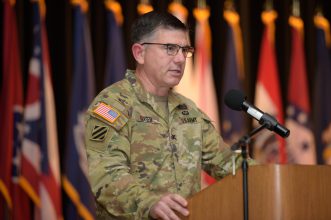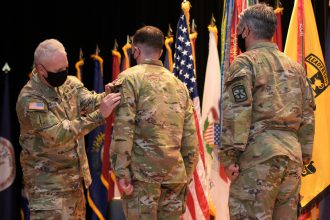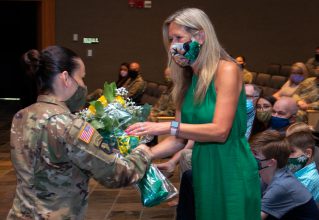
Col. William R. Glaser closed the Welcome Ceremony with a speech about his history at Fort Knox, and the hard work and experience he intends to bring to U.S. Army Cadet Command. The Deputy Commanding Officer Welcome Ceremony was held on June 30 at Waybur Theater in Fort Knox, Ky. | Photo by Mark Webber, VIOS
By Lindsay Grant
The new deputy commanding officer (DCO) of U.S. Army Cadet Command was introduced to the Fort Knox community on June 30 in a socially distanced welcome ceremony held on post at Waybur Theater. Col. William R. Glaser assumed his duties as DCO earlier this month after completing his last assignment as Chief of Staff for the 7th Army Training Command in Grafenwoehr, Germany.

Maj. Gen. John R. Evans places the Cadet Command patch on Col. William Glaser’s uniform in the Patching Ceremony. The Deputy Commanding Officer Welcome Ceremony was held on June 30 at Waybur Theater in Fort Knox, Ky. | Photo by Mark Webber, VIOS
“You’ve got a big job ahead of you, but we know that you’re up to it,” said Major General John R. Evans, Commanding General of U.S. Army Cadet Command. As deputy commanding general, Glaser will be at the forefront of Cadet Command’s Operation Agile Leader mission, a training exercise designed to take the place of the annual Cadet Summer Training for Army ROTC Cadets at Fort Knox. After the summer training on Fort Knox was cancelled due to COVID-19 concerns, Cadet Command tasked each of the over 200 battalions to perform a compressed training exercise that could be conducted closer to their respective university campuses. The senior leader team at Cadet Command will oversee nearly 70 of the Operation Agile Leader training exercises to ensure that Army ROTC Cadets are adequately prepared to commission as officers and move forth to their first Army assignment.
“It does not take long to figure out that the people here at Fort Knox and, US Army Cadet Command, are what makes this place so special,” said Glaser during the ceremony. As a newly commissioned officer in 1993, Glaser met his wife on post at the Fort Knox chapel, where they were married in 1995 and baptized their three children, “Home is where the Army sends us. But of all the places we have been, we consider Fort Knox our home. We are so happy to be back.”

Mrs. Kathy Glaser, wife of Col. William R. Glaser, is presented with a bouquet of yellow rosebuds welcoming her to Cadet Command and Fort Knox. Yellow is the color of friendship, and the buds represent the hopes of a blossoming relationship during the Glaser’s time at Fort Knox. The Deputy Commanding Officer Welcome Ceremony was held on June 30 at Waybur Theater in Fort Knox, Ky. | Photo by Mark Webber, VIOS
Glaser received his commission in 1993 through the United States Military Academy at West Point, a fact of which Evans believes can be an asset to Cadet Command. In his remarks, the commanding general stated his hopes that Glaser can bring a different perspective to training future Army officers, and can identify blind spots within Army ROTC curriculum in order to build and maintain prestige within the program. In Glaser’s remarks, he noted that Army ROTC is the largest commissioning source in the Army – larger than the United State Military Academy, Air Force and Navy ROTC as well as Officer Candidate School – and that he was looking forward to learning and leading as deputy commanding officer.
Prior to his most recent assignment in Germany, Glaser served as Director of the National Simulation Center at Fort Leavenworth, Kan, “His diversity and experience will be essential as we continue to move the command into the 21st century, particularly in an environment when increasingly we will rely on the power of modeling simulations and virtual constructs to achieve training outcomes,” said Evans.
Glaser’s Army career spans the world with assignments including Director of Training and Doctrine Command Project Office and commanding the 2nd Brigade Headquarters and Headquarters Company during Operation Desert Spring in Kuwait and Iraq. His military awards and decorations include the Legion of Merit, Bronze Star Medal, Defense Meritorious Service Medal, Army Meritorious Service Medal, Army Commendation Medal, Army Achievement Medal, the Parachutist Badge and the Combat Action Badge.




